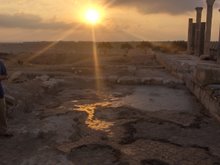Well, I apologize for my lack of correspondence. This, along with various other posts, is certainly overdue. For those who haven't given up hope of ever receiving an update, I hope this suffices for time lost and frustration.
A helpful bit of information: Click here to visit Abila's official website where information regarding the excavation and its history, along with broad historical surveys of the city of Abila, can be obtained.
A helpful bit of information: Click here to visit Abila's official website where information regarding the excavation and its history, along with broad historical surveys of the city of Abila, can be obtained.
__________________________
After considerable delays, two flight cancelations, and a re-routed connection through Bahrain (an island off the eastern coast of Saudi Arabia), myself and nine others from John Brown University arrived in Amman, Jordan on Sunday June 15th. There we joined another group of thirty-two students and archaeologists from the USA, Denmark, and Australia, some whom I already knew from the 2006 dig season. The hotel we stayed in for two nights was really nice, meaning AC and western toilets, a much needed time of rest as we recuperated from the exhausting trip. To be honest, I'm still acclimating to the time changes and boiling Jordanian heat. While in Amman, we toured numerous excavations, including a large Roman theatre, a Roman temple dedicated to Hercules, an Umayyad (early Islamic—A.D. 634-750) palace, and several Byzantine Christian churches. I am very thankful to experience Jordanian life again. It is so wonderful to spend time with and learn from people who affirm similar values as me, yet who do so within a vastly different social, cultural, and religious context...the centrality of faith and the importance of family and friendship, the need to regard material possessions as means to pursue and enrich relationships, not as ends in themselves, not to mention nargeela, or hookah, and native Jordanian cuisine. The morning of our first day in Amman, I ate the following for breakfast: three hard-boiled eggs, ten to twelve halved tomato and cucumber slices, loads of real humus and flat bread, a slice of buttered toast with strawberry jam, green olives, orange juice, tea, and Turkish coffee.
_________________________________________
Setting Up Camp 6.17.2008
Tuesday morning, our group traveled north two hours to Hartha, Jordan, a small village of 8,000 located close to our dig site, the ancient Decapolis city of Abila. We stay in a four-story madrasa, or school. We set up camp, unloaded and assembled our tools and excavation gear, cleaned the filthy restrooms converting some into shower stalls, and settled into a week of orientational meetings and seminars—i.e., how to perform pottery washing and reading, how to fulfill registry duties, including recording and stowing data, etc. We actually began digging the following Monday. Our daily schedule is as follows:
4:00 a.m. Rising Bell
4:15 a.m. Breakfast—consisting of congealed grits/porridge
4:55 a.m. Leave for the site of Abila
5:15 a.m. Work begins (slowly)
9:00 a.m. Second breakfast—consisting of hard a hard-boiled egg, a tomato, a cucumber, pita bread and Happy Cow cheese spread, a peach and a plum.
9:30 a.m. Work resumes
12:30 p.m. Work in field ends
1:00 p.m. Lunch
3:00 p.m. Rest—meaning showers and sweaty naps
4:00 p.m. Pottery reading and assigned chores
6:00 p.m. Supper
7:00 p.m. Lectures
10:00 p.m. Lights out
Tuesday morning, our group traveled north two hours to Hartha, Jordan, a small village of 8,000 located close to our dig site, the ancient Decapolis city of Abila. We stay in a four-story madrasa, or school. We set up camp, unloaded and assembled our tools and excavation gear, cleaned the filthy restrooms converting some into shower stalls, and settled into a week of orientational meetings and seminars—i.e., how to perform pottery washing and reading, how to fulfill registry duties, including recording and stowing data, etc. We actually began digging the following Monday. Our daily schedule is as follows:
4:00 a.m. Rising Bell
4:15 a.m. Breakfast—consisting of congealed grits/porridge
4:55 a.m. Leave for the site of Abila
5:15 a.m. Work begins (slowly)
9:00 a.m. Second breakfast—consisting of hard a hard-boiled egg, a tomato, a cucumber, pita bread and Happy Cow cheese spread, a peach and a plum.
9:30 a.m. Work resumes
12:30 p.m. Work in field ends
1:00 p.m. Lunch
3:00 p.m. Rest—meaning showers and sweaty naps
4:00 p.m. Pottery reading and assigned chores
6:00 p.m. Supper
7:00 p.m. Lectures
10:00 p.m. Lights out








English/Arabic Dig Vocabulary—Lesson 1 (A Transliteration)
Good morning Sabah el khair
(Reply) Sabah el noor
Good Evening Masa el khair
(Reply) Masa el noor
Hello Marhaba
Welcome Ahlan we-sahlan
Greetings Assalam 'alaikoom
Goodbye Ma'assalama
Please Min fadlak
Min fadlik (f)
Thank you Shukran
My name is... Ismi
Yes Na am
No La a
Slowly Shway shway
Trowel Mastarin
Pick Mankush
Brush Furshay
Wheelbarrow Arabay
Sherds Fukhar
Glass Gazzaz
Bone Adim
Stone Hajar

1 comment:
Well, I'm not sure who you are, but this is Maria Deutschmann from the '06 dig season. I was up this morning at 5:00 am just thinking of the Abila dig, praying for you all, and wishing that I was there as well.
So, I stumbled around on the internet and was excited to pull up your blog and hear and see just a bit of what has been going on.
Keep it coming.
maria
intucson.blogspot.com
Post a Comment